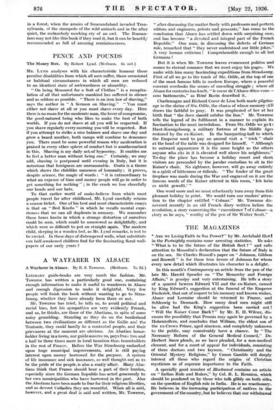A WAYFARER IN ALSACE
A Wayfarer in Alsace. By B. B. Townroe. (Methuen. 7s. Od.) LITERARY guide-books are very much the fashion. Mr. Townroe has written a particularly good one, containing enough information to make it useful to wanderers in Alsace and enough digression to make it delightful. Very few people will finish the book without wanting to go to Stras- bourg, whether they- have already been there or not Mr. Townroe has tried, he tells us, to avoid political and racial bias, but his sympathies are very evidently French, and so, he thinks, are those of the Alsatians, in spite of some noisy grumbling. Standing as they do on the borderland between two civilizations so different as the Gallic and the Teutonic, they could hardly be a contented people, and their grievances at the moment are obvious. An Alsatian house- holder living in a town, our guide assures us, pays from two and a half to three times more in local taxation than householders in the rest of France. Before the War Strasbourg embarked . upon huge municipal improvements, and is still paying interest upon money borrowed for the purpose. A system of life insurance and sick insurance, so well thought out as to be the pride of the people, is also a costly affair. Many Alsa- tians think that France should bear a part of their burden, especially since the German Republic has acted generously to her own municipalities who have borrowed in the past. Also the Alsatians have been made to fear for their religious liberties, and as devout Catholics they are resentful. When all is said, however, and a great deal is said and written, Mr. Townroe, " after discussing the matter freely with professors and porters, editors and engineers, priests and peasants," has come to the conclusion that Alsace has settled down with surprising ease, and has become a devoted and integral part of the French Republic." One man, in discussing the defects of German rule, remarked that " they never understood our little jokes." A very human criticism ! Comprehensible enough to all but Germans !
But it is when Mr. Townroe leaves evanescent politics and comes to eternal romance that we most enjoy his pages. We make with him many fascinating expeditions from Strasbourg. First of all we go to the tomb of Ste. Wile, at the top of one of the most famous hills in modern Europe, where a peaceful convent overlooks the scenes of unending struggle ; where all Alsace for centuries has knelt, " le coeur de l'Alsace dites-vous- sans battements," as Rene Bazin described it.
Charlemagne and Richard Coeur de Lion both made pilgrim- age to the shrine of Ste. Odile, the charm of whose memory still draws the faithful to pray. It was prophesied of her at her birth that " the dove should subdue the lion." Mr. Townroe tells the legend of its fulfilment in a manner to explain its fascination to the most incredulous. From Ste. Odile we go t) Haut-Kcenigsbourg, a military fortress of the Middle Ages restored by the ex-Kaiser. In the banqueting-hall to which the Emperor used to pay an annual visit a trick " chair at the head of the table was designed for himself. " Although to outward appearance it is the same height as the others anyone who sits in it is elevated well above his neighbours." To-day the place has become a holiday resort and short visitors are persuaded by the jocular custodian to sit in the Kaiser's chair. No sightseer, however, will go away entirely in a spirit of bitterness or ridicule. " The fender of the great fireplace was made during the War and engraved on it are the famous words of the Kaiser uttered in this room, lel) habc es nicht gewollt.' " One word more and we must reluctantly turn away from this pleasant holiday in print. We would turn our readers' atten- tion to the chapter entitled " Colmar." Mr. Townroe dis- covered recently in an old French diary written before the revolution, a story concerning the " executioner 1 of Colmar—a story as he says, " worthy of the pen of Sir Walter Scott."














































 Previous page
Previous page